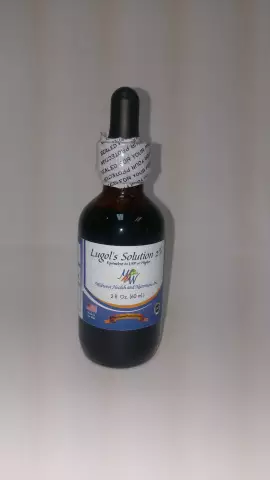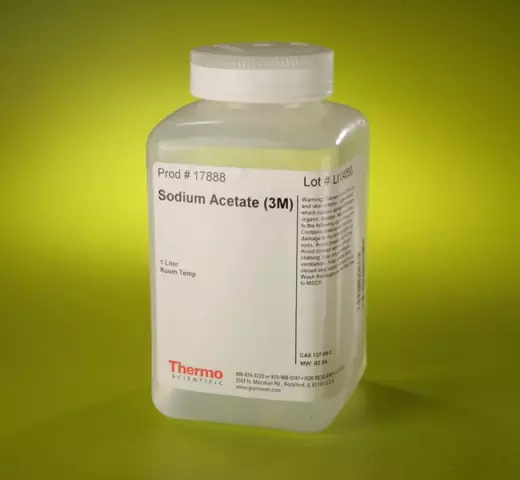- Author Rachel Wainwright wainwright@abchealthonline.com.
- Public 2023-12-15 07:39.
- Last modified 2025-11-02 20:14.
Lespenephril
Lespenefril: instructions for use and reviews
- 1. Release form and composition
- 2. Pharmacological properties
- 3. Indications for use
- 4. Contraindications
- 5. Method of application and dosage
- 6. Side effects
- 7. Overdose
- 8. Special instructions
- 9. Application during pregnancy and lactation
- 10. Drug interactions
- 11. Analogs
- 12. Terms and conditions of storage
- 13. Terms of dispensing from pharmacies
- 14. Reviews
- 15. Price in pharmacies
Latin name: Lespenephryl
ATX code: G04BX50
Active ingredient: Lespedeza capitate (Lespedeza capitata) + ordinary anise (Anisi vulgaris)
Producer: UCB HealthCare (France)
Description and photo update: 2019-09-09

Lespenephril is a drug with diuretic and anti-azotemic action.
Release form and composition
The drug is produced in the form of a solution for oral administration (120 ml each in dark glass vials, 1 vial in a cardboard box and instructions for the use of Lespenefril).
10 ml of solution contains active ingredients:
- Lespedeza capitate (in the form of tincture) - 1.5 ml;
- Anise (in the form of an essence) - 0.025 ml.
Auxiliary components: ethyl alcohol - 6.2 ml, water - up to 10 ml.
Pharmacological properties
Pharmacodynamics
Lespenephril is one of the herbal preparations that reduce the level of nitrogen in the blood in patients with its pathological increase.
Reduces azotemia, increases renal filtration, increases diuresis, urinary excretion of nitrogenous toxins, excretion of Na + and, to a lesser extent, K +.
Indications for use
Lespenephril is prescribed for the treatment of chronic renal failure occurring in a latent and compensated stage (along with other drugs).
Contraindications
A contraindication to the use of Lespenefril is hypersensitivity to the components of the drug.
It is not recommended to take the drug for lactating and pregnant women (because of the ethyl alcohol it contains).
Lespenefril, instructions for use: method and dosage
Lespenefril solution is taken orally, preferably before meals.
A single dose is 1-2 teaspoons, the frequency of administration is 2-3 times a day, the duration of the treatment course is from 3 to 4 weeks.
Before use, a single dose must be diluted with a little water.
Side effects
During the period of therapy, side effects may develop in the form of allergic reactions, in rare cases - headache, dizziness, tachycardia and weakness.
Overdose
The main symptoms of an overdose are associated with the presence of ethyl alcohol in the preparation.
special instructions
The ethanol content in the average daily dose is 2.9-11.6 g.
Influence on the ability to drive vehicles and complex mechanisms
The drug must be taken with caution by patients whose work is associated with increased concentration of attention, including motor vehicle drivers.
Application during pregnancy and lactation
It is not recommended to use Lespenefril during pregnancy / lactation.
Drug interactions
Because of the ethyl alcohol that is part of the solution, it is not recommended to use it simultaneously with drugs that depress the central nervous system, oral hypoglycemic agents, insulin, as well as drugs that, in combination with alcohol, can lead to the development of antabuse-like reactions.
Analogs
Lespenefril analogs are: Pilosuril, Bufenox, Lasix, Furosemide.
Terms and conditions of storage
Store in a protected place, out of reach of children, at temperatures up to 25 ° C.
The shelf life is 5 years.
Terms of dispensing from pharmacies
Dispensed by prescription.
Reviews about Lespenefril
Reviews about Lespenefril are mostly positive. Patients report an improvement in their well-being. Also, the therapeutic effect is confirmed by the results of clinical tests. The main disadvantage is the presence of alcohol in the composition of the drug.
Price for Lespenefril in pharmacies
The price of Lespenefril is unknown, since the drug is not available in pharmacies.
The approximate cost of analogues: Lasix (45 tablets of 40 mg) - 52 rubles, Furosemide (50 tablets of 40 mg) - 25-33 rubles.

Anna Kozlova Medical journalist About the author
Education: Rostov State Medical University, specialty "General Medicine".
Information about the drug is generalized, provided for informational purposes only and does not replace the official instructions. Self-medication is hazardous to health!






